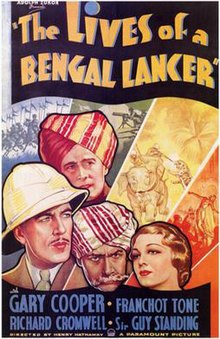| The Lives of a Bengal Lancer | |
|---|---|
 Theatrical release poster | |
| Directed by | Henry Hathaway |
| Screenplay by | William Slavens McNutt Grover Jones Waldemar Young John L. Balderston Achmed Abdullah Laurence Stallings (offscreen credit)[1] |
| Based on | The Lives of a Bengal Lancer 1930 novel by Francis Yeats-Brown |
| Produced by | Louis D. Lighton |
| Starring | Gary Cooper Franchot Tone Richard Cromwell Guy Standing |
| Cinematography | Charles Lang |
| Edited by | Ellsworth Hoagland |
| Music by | Herman Hand John Leipold Milan Roder Heinz Roemheld |
Production company | |
| Distributed by | Paramount Pictures |
Release date |
|
Running time | 109 minutes |
| Country | United States |
| Language | English |
| Box office | $1.5 million (worldwide rentals)[2] |
The Lives of a Bengal Lancer is a 1935 American adventure film starring Gary Cooper, directed by Henry Hathaway, and written by Grover Jones, William Slavens McNutt, Waldemar Young, John L. Balderston, and Achmed Abdullah. The setting and title come from the 1930 autobiography of the British soldier Francis Yeats-Brown.
The story, which has little in common with Yeats-Brown’s book, tells of a group of British cavalrymen and high-ranking officers desperately trying to defend their stronghold and headquarters at Bengal against the rebellious natives during the days of the British Raj. Cooper plays Lieutenant Alan McGregor, Franchot Tone, Lieutenant John Forsythe, Richard Cromwell, Lieutenant Donald Stone, Guy Standing, Colonel Tom Stone, and Douglass Dumbrille plays the rebel leader Mohammed Khan, who speaks the now often-misquoted line "We have ways to make men talk."[3][4][5]
The film was produced and released by Paramount Pictures. Planning began in 1931, and Paramount had expected the film to be released that same year. However, most of the location footage deteriorated due to the high temperatures, and the project was delayed. It was eventually released in the US in 1935.
It met with positive reviews and good box office results, and was nominated for seven Academy Awards, winning Assistant Director, with other nominations including Best Adapted Screenplay and Best Picture. The film grossed $1.5 million in worldwide theatrical rentals.[2]
- ^ "AFI|Catalog".
- ^ a b Welky 2008, pp. 88–89.
- ^ Deis, Robert (January 11, 2015). "The Origin of the Movie Cliché 'We Have Ways of Making You Talk!'". This Day in Quotes. Retrieved April 4, 2016.
- ^ Knowles 1999, p. 196.
- ^ "Top 15 Film Misquotes" (October 18, 2007). Listverse. Retrieved July 13, 2015.